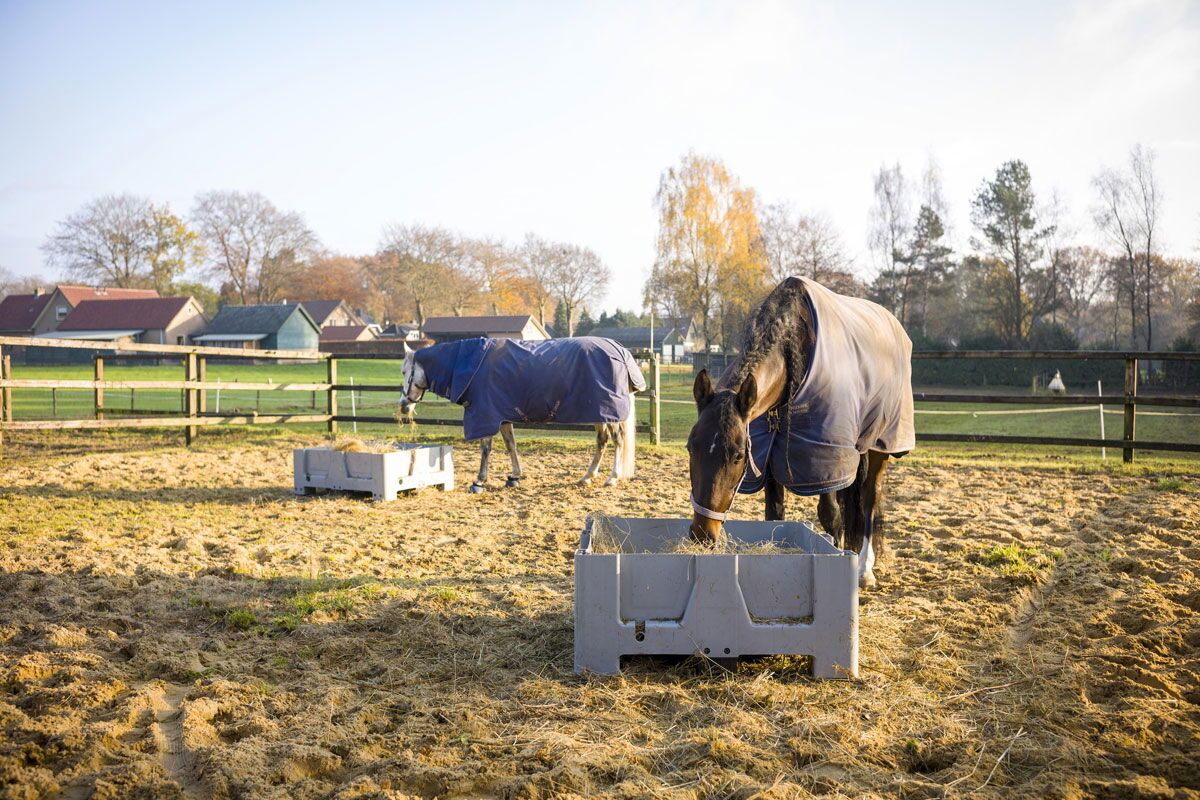The days are getting shorter and shorter, your horse’s coat is getting longer, and the temperature is falling fast: this must mean that winter is coming! And winter poses challenges for you as a horse owner. What is the best way to keep your horse warm? How to ensure good ventilation now that the horses are spending more time in their stables? Of course, there are many competition riders who take their horses south to compete in winter shows. In this blog, we will discuss winter, its challenges, and a few solutions if you and your horse aren’t traveling this winter.
We all know what winter means for us but what does it mean for our horses? It’s the coldest season of the year. This varies in different parts of the world, but in the US winter is between December and March. Not only the time of winter differs worldwide, but also the cold itself – far different in New York than it is in Texas. It is the difference between a cold climate (between 5° F and 50° F) and a moderate climate (between 50° F and 75° F). It also matters whether your horse is a foal or an adult. A foal is, logically, less able to keep itself warm when it is cold.
Winter is different all over the world
It’s also important to understand that your horse’s Body Condition Score (BCS) will also have an effect on his body temperature. A horse that is too thin will have difficulty staying warm. That horse feels better in a warm environment. A horse that is too thin needs all its energy for maintenance. The extra energy that he needs to keep himself warm is available only to a very limited extent. As a rule, every horse loses a little weight in winter. A horse with a healthy weight (a BCS of 5 or 6 on the Henneke scale) will have no problems with colder environments.
Feeding for a good body temperature
The picture below illustrates why a horse’s energy is so important. A horse in the thermoneutral zone doesn’t need a lot of energy to maintain its body temperature. When it gets colder, the body will start using more energy to maintain the right temperature. You could say that it is only cold when the horse has to use energy to keep itself warm. The best strategy for helping your horse maintain a comfortable body temperature (both indoors and out) is to feed it roughage. The digestion of fiber produces heat. You might consider giving him a warm mash as a little extra treat.
Omega-3 and omega-6
These days, young horses and broodmares are stabled in winter, where they have access to unlimited roughage – a luxury for horses that are used to 24/7 turnout in warmer seasons. Unprocessed roughage keeps the digestive system working continuously. Keep in mind that roughage alone is never sufficient. The horse may get enough in terms of energy intake, but they won’t get the vitamins and minerals that they get from fresh grass. In addition, roughage alone will not give a horse the omega-3 and omega-6 fatty acids that it needs. These are what are called essential fatty acids, meaning that the body needs these substances but cannot produce them itself. The fatty acids must therefore be taken in via feed. This is not only important for broodmares and young horses, but for all horses that are kept stabled during the winter season.
Omega-3 & omega-6 are not produced by the body itself
Horses that spend most of their time in the barn, because outdoor grazing is either not possible or not practicable, often have a lower intake of omega-3 fatty acids. It is important that the ratio between omega-3 and omega-6 fatty acids remains in balance. If this ratio is in balance, the horse will automatically produce enough omega-9.
The correct ratio of omega-3 and omega-6 fatty acids not only has a positive effect on the immune system but also on the overall health of the horse. An imbalance between these fatty acids may lead to inflammation, a poor coat, a weakened immune system, and reduced fertility.
Resistance always takes priority
Horses don’t get sick from the cold but reduced resistance can make them susceptible! Just like with people, horses’ natural defenses can decrease in winter. Being inside also has an influence, but temperature fluctuations can also cause your horse’s resistance to be lower than ideal. In the video below, you’ll learn how to keep your horse’s immune system strong.
Tips from our nutritionists: getting through the winter with the right products
With winter comes change: your horse transitions from fresh grass to roughage and is kept inside more. Your horse will not get enough vitamins and fiber from roughage alone. That is why replenishment is important. Add balancers to the ration to make up for any shortages. We recommend Nutri Plus. This product contains a well-balanced mix of vitamins and minerals – everything a horse needs apart from roughage.
Another suggestion is our Cavalor Mash & Mix. This mash is a highly digestible and tasty mix of puffed and flaked grain, bran, linseed, prebiotics, and dried vegetables. Soak it 15 minutes before feeding to give your horse a warm winter treat.
Natural resistance is important to us at Cavalor, and we know that good resistance does not always come naturally. That’s why we have developed products to support your horse’s natural defenses. OilMega ensures good equine health from the inside out. Omega 3 – 6 – 9 fatty acids together with natural antibiotic properties ensure a healthy gut flora and extra support for the immune system.
Is your horse’s immune system already strained? Do you have an older horse, one that travels a lot, or that has just been vaccinated? Then he may need a little extra help. Resist + Vit C is a powder blend of antioxidants, herbal extracts, and essential oils that help strengthen the immune system. A combination of different antioxidants is more effective than a high dose of one antioxidant because each works in different ways.
Want to read more about horses and the winter season? We’ve written several articles on this topic. Click this link to read more about keeping your horse in good shape during the winter while you both stay warm inside and daydream about playing outside as soon as Spring gets here.


